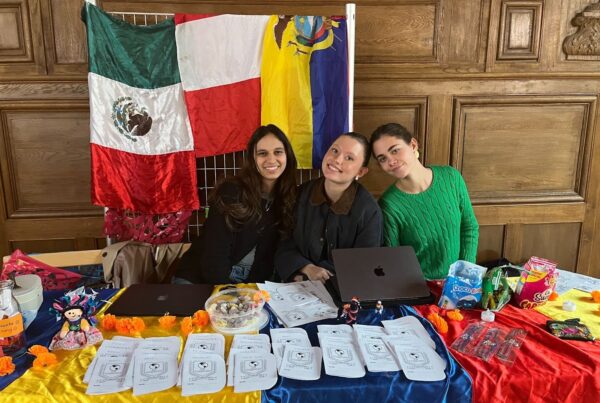College is said to be both an exciting and confusing chapter in every new student’s life, but perhaps this is even more true for us, Sciences Pistes. While Sciences Po ranks as the fourth best university in the world for politics according to QS, it lacks the internationally recognizable brand of Harvard or Oxford, Sciences Po’s closest competitors in the rankings. With almost half of Reims campus students coming from abroad, a lot of students were unsure of what to expect from this institution, which somehow manages to be both prestigious and unknown, international, yet French.
How does the reality of studying at Sciences Po measure up to students’ expectations, if they even had any? Four students shared their insight into whether or not Sciences Po is all it’s made out to be.
The expectations students had for Sciences Po differ sharply between French and international interviewees. When I asked Daphné Philipp, a student from the east of France, how she first heard about the institution, she replied “if you grow up in France, Sciences Po doesn’t need an introduction—everyone has heard of it. Of course, it gets its fair share of criticism, often from people who can’t even define the words they’re using. But, the sheer number of high-profile alumni speaks for itself. In my family, no one had ever attended, but there’s this universal understanding: if you see Sciences Po on someone’s CV, you know they’re the real deal.”
Meanwhile, for an American student in the Columbia Dual BA program, who wished to be anonymous, Sciences Po was a complete unknown: “I didn’t really know that Sciences Po itself was like a school, school. I assumed it was just kind of part of the whole Columbia empire. So I didn’t realize that it was really prestigious and a really great place.”
No matter if they grew up in France or found out about the school due to its high place in university rankings, it seems that the interviewed students expected Sciences Po to be more academically rigorous. The American Dual BA student expected that “the teachers were going to be more intense and that everyone would come to school wearing a suit and a tie every day. To an extent it is [an intense school.] But for the most part, it’s kind of really chill here.”
Daphne echoed the same sentiment, saying that she “expected more work. The amount of reading is way beyond what I imagined (not that I’m complaining), but I was so used to overworking myself in high school for things that barely mattered that I thought Sciences Po would push me even harder. I’m obviously not talking about midterms and finals, that’s pure survival mode—history still haunts me at night. But overall, I love that you can truly invest your time in what excites you, whether it’s specific courses, research, or student associations.”
While the workload might offer respite for some, others raise concerns about Sciences Po’s academic quality. Sofia Coupland, a British and Colombian student who found out about Sciences Po due to its high ranking, was “surprised about the range in the quality of teaching.” She recalls that during the previous semester, a teacher she had seemed like he “just didn’t know what he was talking about, and the entire class struggled a lot.” This lack of standardization in teaching quality and grading raises worries about applying for third-year exchanges, making it feel like “it’s mostly dependent on luck and who you get as a teacher, rather than each student’s academic abilities.”
Besides academic work, students also had various preconceptions about what social life would be like at Sciences Po. For an institution that mentions Paris in its official name, the Reims campus—smaller than Paris’s, and tiny by American standards—turns out to be both a blessing and a challenge. Sofia reveals that while being on a small campus “has some cons, it has a lot of pros in the sense that we’re very united. It’s very easy to meet new people. Everyone here is very kind.” She believes these aspects would have been lost in a busier setting. Daphne also praises what she sees as a “welcoming environment.” She emphasized that “coming from a place where most people have the same background, it’s incredible to meet people from so many different cultures every day”.
However, others are disappointed by some aspects of the social environment. A student from Eastern Europe was surprised to find that there’s no single platform listing campus events since each association promotes events on an individual Instagram page. “I really don’t want to follow 30 different accounts just to know what’s happening. It feels like a full-time job,” they said. While the [Bureau des Eleves] reposts associations’ stories, gathering them in one place, it is certainly true that keeping up with campus life is hard without an Instagram account. Additionally, they feel that the institution is “very French centered” and not speaking this language fluently creates barriers to fully integrating into campus life.
These students’ insights reveal that studying at Sciences Po—perhaps similarly to any other university—is a mixed bag. Overall, French students accustomed to viewing Sciences Po as a prestigious institution, as well as international students whose impressions were mostly formed by the university’s rankings, seemed to expect a more academically rigorous environment and a higher quality of teaching. Nevertheless, less schoolwork leaves more room for engaging with the active and international student community, even if communication about upcoming events can sometimes feel a little disorganized.
What would these students tell a Sciences Po applicant? What are the things that the official Sciences Po website does not warn you about?
Our Columbia Dual BA student advises to take the talk about an academically challenging environment with a grain of salt. “A lot of people go here thinking that they are going to have to grind, grind, grind all the time and that there’s going to be no time to have fun. That’s not true. I’ve been able to travel, have a lot of fun. It’s been a really great time.” Meanwhile, the Eastern European student recommends keeping in mind that “there are not going to be a lot of accommodations for you if you don’t [speak French]. If you’re not ready to commit to learning a language on a really high level and very intensely, then maybe rethink coming here because that’s going to be a very big focus.” They noted that they have six hours of French class per week—more than any other subject.
In traditional Sciences Po fashion, Sofia turns the premise of the question upside down. “[Studying at Sciences Po] is more about expecting the unexpected,” she says. “I feel like no matter who you are or where you come from, studying here is a very unique experience. That means that you have to be resilient, but you also have to be open-minded: be ready to have fun adventures, meet new people, and just be ready for everything.” She additionally felt that Sciences Po might not be the “right place for those looking for predictability.”
“Impostor syndrome is real”, says Daphne. She advises prospective students to be ready for their “ego tak[ing] a hit during the first weeks,” especially for those coming from French high schools. “You’ll meet students who seem light-years ahead of you, especially if you were used to being top of your class. You’ll struggle to find your words, maybe even blank out during oral exams. There will be days where you feel like you’ll never measure up, where you wonder if you ever should have applied in the first place. But no one here ‘deserves’ their spot more than you. Push yourself, meet incredible people, attend conferences, go to lectures, grab every opportunity that comes your way. Enjoy every second.”
Other posts that may interest you:
- New Semester, New Projects: Discover the New Student Initiatives
- Police Action, General Assemblies, Online Arguments – What Happened on March 21?
- How to Politicize a Tragedy: The Murder of Iveta
- Your Guide to the March 12 Blockade
- What’s Up With the Clocks on Campus?
Discover more from The Sundial Press
Subscribe to get the latest posts sent to your email.





